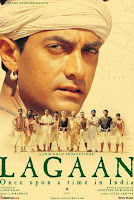Growing up, the pickings for Indian film and television available here in New Zealand were slim. All I knew was 90s and early 2000s Bollywood, and let's just say, not a lot of it resonated (although with age and wisdom, I've reversed that view).
Thankfully, Netflix today has a treasure trove of Indian offerings, and not just in the Bollywood genre. All of these help showcase the diversity within India, the social/political issues that are relevant, and how the culture has developed over time. Here are some of my picks for dipping your toes into the Indian Netflix scene (full plots are given in the links). [Note I am neither an expert nor a connoisseur, my recommendations are basic. Probably the Indian equivalent of recommending Friends to someone who has never watched US television before]
My number one pick: Lagaan
The film Lagaan is all about cricket. I hate cricket. I should not enjoy this film as much as I do. And yet, it is the best. It is an epic underdog story between the Indian villagers and the British rulers. It tells the story of a truly evil tax system (hi there, 'tax is love' brigade). And has a great soundtrack to match. Watch it for some history of British rule. Watch it for one of the most nail biting cricket matches of all time. Watch it because it's a classic.
If you want to the epitome of the Bollywood genre: Kabhi Khushi Kabhie Gham
I've always had a soft spot for this film, and I've yet to come across another film that has quite met this standard. Everything about it is OTT. It is a treat for the senses, and the soundtrack accounts for a disproportionate number of bangers for the era. The main theme of the film is all about the importance of family, which is not the most compelling pitch when I'm trying to sell it to others. Except it just is Bollywood.
If you're interested in Bollywood but also need a solid storyline: Swades
Not all Bollywood films have a compelling plot, which is why I'm rather partial to Swades. This film is entertaining enough, but also effectively deals with some important subjects like the caste system, village politics and the importance of educating girls. It still has the traditional Indian tropes of song and dance, but I liked that this just felt a bit more substantial than some of the other Bollywood offerings.
If you want to know what an arranged marriage entails for Indians today: Indian Matchmaking (limited Netflix series):
Well, this is awkward. I was going to wax lyrical about how great this show is. Except when I went to Google it for a plot summary, it turns out that opinion is really divided (the link is just one of the examples of the criticism the show has received). But personally, I really really liked this show. Even as an Indian, I only had a vague understanding of what arranged marriages entail in the modern era, so the show is educational in that respect. I was also fascinated by the diversity of approaches to the custom and the attitudes of Indians towards love and marriage in general: from the culturally conservative to the more Western influenced.
Yes, there are parts that made me cringe: such as the obsession with caste and skin colour, and some of the attitudes around being a dutiful wife. But I think the show works because it has layers. On one level, you can enjoy it for what it is: an entertaining and educational look into an age old practice, with some lovable (and some less so) characters to draw you in. On a deeper level, there's enough material in there to write essays on the diversity of cultural attitudes within India and its diaspora today. If you think all arranged marriages are degrading for women and take away their personal choice, watch this show: things are never that simple.
For an uplifting story of innovation, perseverance and challenging cultural norms: Pad Man
I didn't really know what to expect going into this film. I definitely didn't anticipate it being such a fascinating look into the innovation process and the perseverance required before success. This is a sweet and heartbreaking story about one man's attempts to develop hygienic and affordable sanitary pads, within a context where people, but especially men, are not supposed to talk about 'women's issues'.
A serious subject, made lighter with Bollywood flair: Toilet: Ek Prem Katha
The importance of hygienic sanitation in India's rural villages doesn't really scream Bollywood. It is a serious subject that raises important issues around women's safety, public health, and how difficult it is to shift religious and cultural norms. Maybe it's one of those things you have to see to believe, but I think the juxtaposition of the song and dance numbers enhanced the film. In any case, it's something different, something educational, and something that sticks in your head.
#MeToo, but make it Indian: Bombay Begums (limited Netflix series)
Welcome to postmodern India. What shocked me most about this series was how undeniably new it felt. Granted, this is a Netflix series so the cinematography is distinctly spectacular. Perhaps it was the seamless merging of Western and traditional Indian culture throughout. Where wearing a sari to board meeting felt just as appropriate as a blazer. Or perhaps it was the ability to touch on universal themes affecting women (like sexual harassment) as well as country-specific (like not being able to rent an apartment as an unmarried woman).
I think this show could easily be written off as an overly-produced drama trying too hard to pander to Western audiences. That would be a mistake. This series makes me excited about the directions Indian film and tv can take in the future, and the stories that are still yet to emerge.

